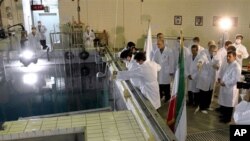The international dispute with Iran over its nuclear program is entering a new phase, with Iran both calling cooperation and also refusing to allow U.N. inspectors into a key facility.
Iranian nuclear facilities are at the heart of the dispute. These sophisticated centrifuges enrich uranium, and if uranium is enriched to a high enough degree, it can be used in nuclear weapons.
Iran prevented inspectors from the International Atomic Energy Agency from visiting such a facility last week.
“Unfortunately, we could not get agreement, so we could not get access and we could not finalize a way forward,” said Herman Nackaerts, IAEA Deputy Director General and head of the Department of Safeguards.
Iran says its nuclear program is for peaceful purposes. Foreign Minister Ali Akbar Salehi says countries that don't believe this have a choice.
“One way is engagement, cooperation and interaction and the other is confrontation and conflict. The Islamic Republic of Iran, confident of the peaceful nature of its nuclear program, has always insisted on the first alternative,” he said.
But the IAEA does not agree, issuing a report describing, among other things, the potential military uses of Iran’s nuclear program.
And senior Western officials note that previous talks have failed, and say Iran must make certain commitments if it wants to move toward new ones.
"Any conversation with Iran has to begin with a discussion of its nuclear program," said U.S. Secretary of State Hillary Clinton. "And second, we must be assured that if we make a decision to go forward, we see a sustained effort by Iran to work until we have reached an outcome that has Iran coming back into compliance with their international obligations."
That would mean the kind full inspections Iran has so far refused to allow.
Iran expert Mark Fitzpatrick says the pattern of offering cooperation and then refusing to provide it reflects the trend of hard-liners in Tehran dominating more moderate elements.
“The fact that the IAEA got nothing is an indication of disputes in Tehran, with the foreign office on one hand, hard-liners on the other," he said. "And the hard-liners again won out, denied any cooperation with the IAEA.”
But former top State Department Iran official Dennis Ross told VOA’s Persian News Network international sanctions may be beginning to change the calculations of even Iran’s staunchest hard-line leaders.
“The context requires applying pressure, but it also requires leaving the Iranian leadership a way out. If they want to find a way to relieve the pressure, you have to give them the chance to do so,” he said.
That’s what western officials are preparing to do, but they are so far not convinced that Iranian officials are really ready to change their policies.
| Join the conversation on our social journalism site - Middle East Voices. Follow our Middle East reports on Twitter and discuss them on our Facebook page. |




